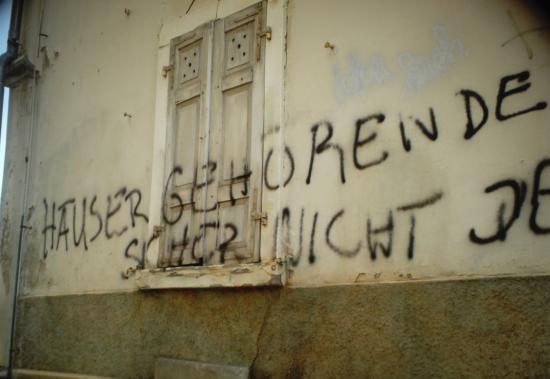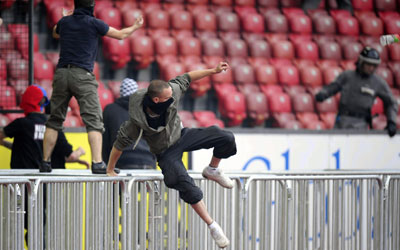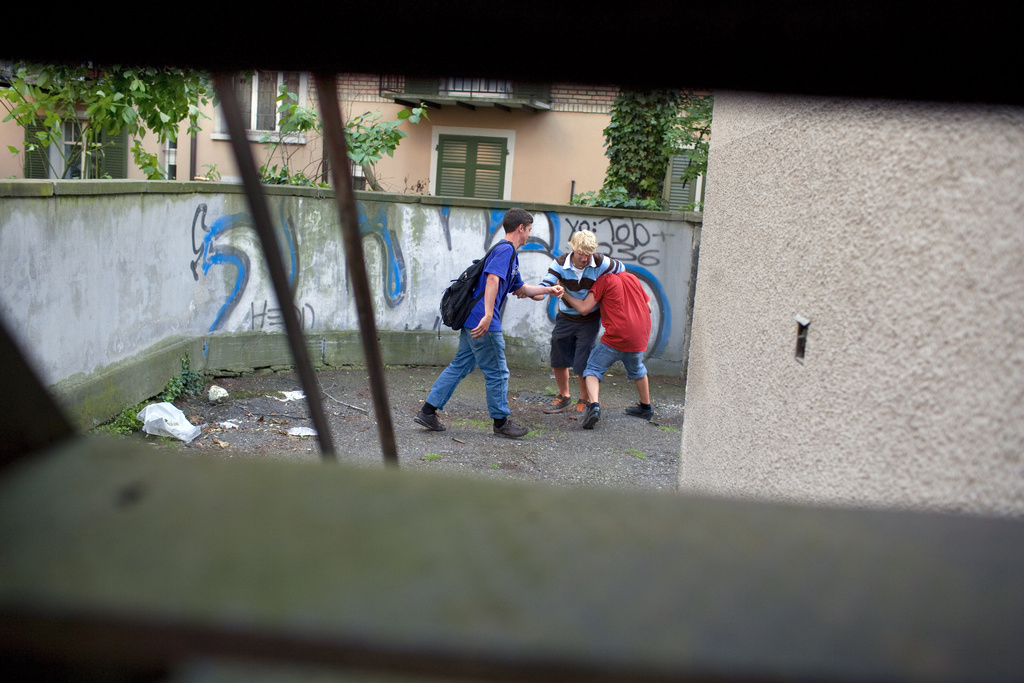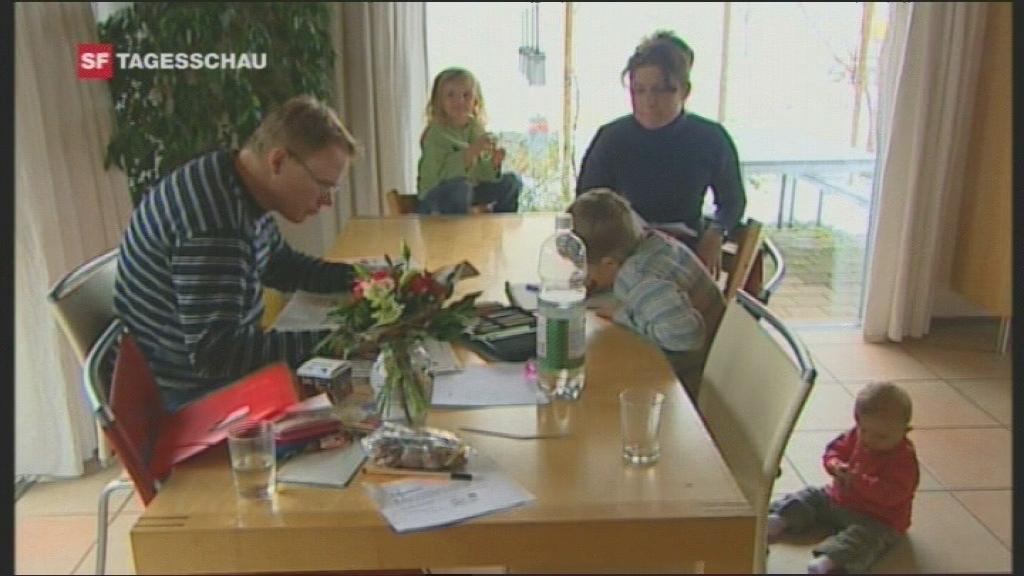Anti-vandalism tactic divides Swiss

Local acts of vandalism rarely make the national news, but the recent “naming and shaming” of young perpetrators in a St Gallen village triggered a general debate.
The story was picked up by broadsheets and tabloids alike, prompting a flood of reader comments, supporting and condemning the mayor of Niederbüren for going public with the boys’ names.
Fed up after a series of vandalism incidents in his postcard-pretty town, Niklaus Hollenstein called on the local community to help identify the perpetrators of a rampage in the last weekend of November, 2009.
Juvenile delinquents broke barn windows, demolished a traffic post and tore down Christmas decorations outside the church – causing damages totalling about SFr4,000 ($3,827).
Residents were able to suss out who the guilty parties were: five local boys between the ages of 12 and 13. Police questioned the youths, confirming that they were indeed to blame.
Later, in a notice in the town’s newsletter, Hollenstein named the youths and thanked community members for their help in solving the crime. The quintet now face charges.
Media whirlwind
With 1,400 residents, Niederbüren is a small town – the circulation of its weekly newsletter even smaller. Yet the story soon attracted national attention when it was picked up by newspapers including Zurich’s Tages-Anzeiger and the mass-circulation Blick.
Some of the boys’ parents were dismayed that their sons were identified publicly in the town newsletter. Yet Blick quoted one father as saying that it was the right thing to do because it would discourage would-be vandals.
As Hollenstein told Blick, “Naming the perpetrators prevents false suspicions and unjust finger-pointing within the community.”
As he later told swissinfo.ch, all five boys were Swiss. “People sometimes like to blame these things on foreigners, but that wasn’t the case.”
According to youth psychologist Allan Guggenbühl, naming the boys publicly was irresponsible – especially for this age group.
“It gives them a false identity – they get a profile as ‘baddies,’” said Guggenbühl, who works at the Institute for Conflict Management in Bern and Zurich.
As he told swissinfo.ch, children this age are in a transitional phase; they’re trying to test the boundaries, and vandalism is often a part of that.
Earlier this month, the Tages-Anzeiger reported that three parties have filed charges against Mayor Hollenstein, complaining that he should not have revealed the names of the boys.
Online debate
Newspaper websites have attracted a flood of reader comments on the issue. Many have written in support of Hollenstein, saying that it’s about time that officials crack down on misbehaving juveniles.
As one Tages-Anzeiger reader wrote, “Acts of vandalism are generally accepted and the taxpayers pick up the tab. This must annoy many orderly taxpayers. I think it’s OK to publish the names, and I hope that more Swiss towns will do the same.”
Others expressed worry that broken windows today could translate into assault and battery tomorrow.
Many readers chastised the parents of the guilty boys. As a Blick reader put it, “The parents’ charges simply show what a crazy world we live in, and that neither the parents nor the youths have learned anything. Parents and children should think about the consequences of their deeds in advance.”
Others criticised Hollenstein: “I’m appalled by the methods used by the mayor. I don’t want to gloss over the boys’ misdeeds – they should be punished. But not with methods from the Middle Ages,” wrote a Tages-Anzeiger reader.
“’Naming and shaming’ is a very archaic way of punishment,” said Guggenbühl. What’s worse, noted the psychologist, is that the perpetrators might even garner admiration from their peers.
Hollenstein has defended his actions, calling for a change in the practice of data protection. He has also emphasised the importance of nipping trouble in the bud so that problem youths don’t cause greater damage in the future.
It takes a village
In addition to plenty of fresh air and open space, Niederbüren has a skateboard park and a clubhouse where teenagers can gather. The clubhouse, run in cooperation with the neighbouring town of Oberbüren, is open to young people on Friday evenings.
Petty vandalism has been a semi-regular occurrence after the clubhouse closes for the night. Some residents have even called for it to close altogether, but in Hollenstein’s view, this would be unfair to the 99 per cent of youths who are well-behaved.
The mayor says it’s up to whole communities to discourage youths from delinquency.
“Twenty years ago, people would have laughed about today’s littering laws. But it’s one example of how society has changed,” he said.
According to the mayor, “The observance of peace and order are values that serve as the basis of our quality of life.”
Susan Vogel-Misicka, swissinfo.ch
Juvenile criminal law has been regulated in a separate Juvenile Criminal Code (JStG) since the beginning of 2007. It applies to children and young people aged between 10 and 18.
The following penalties may be imposed on juvenile offenders:
• a reprimand
• a personal work order (maximum duration normally 10 days, but three months for offenders aged between 15 and 18 who have committed a felony or a misdemeanour)
• fines of up to CHF 2,000 (for 15 to 18 year-old offenders)
• a custodial sentence of up to 1 year (for 15 to 18 year-old offenders)
• a custodial sentence of up to 4 years (for 16 to 18 year-old offenders who have committed a serious felony).
The Juvenile Criminal Code also envisages protective measures that are in keeping with the basic idea described above (“education takes priority over punishment “), including:
• Supervision
• Personal care
• Outpatient treatment
• Placement (in the care of private individuals or in an educational establishment or an institution)
Source: Federal Chancellery

In compliance with the JTI standards
More: SWI swissinfo.ch certified by the Journalism Trust Initiative




You can find an overview of ongoing debates with our journalists here. Please join us!
If you want to start a conversation about a topic raised in this article or want to report factual errors, email us at english@swissinfo.ch.